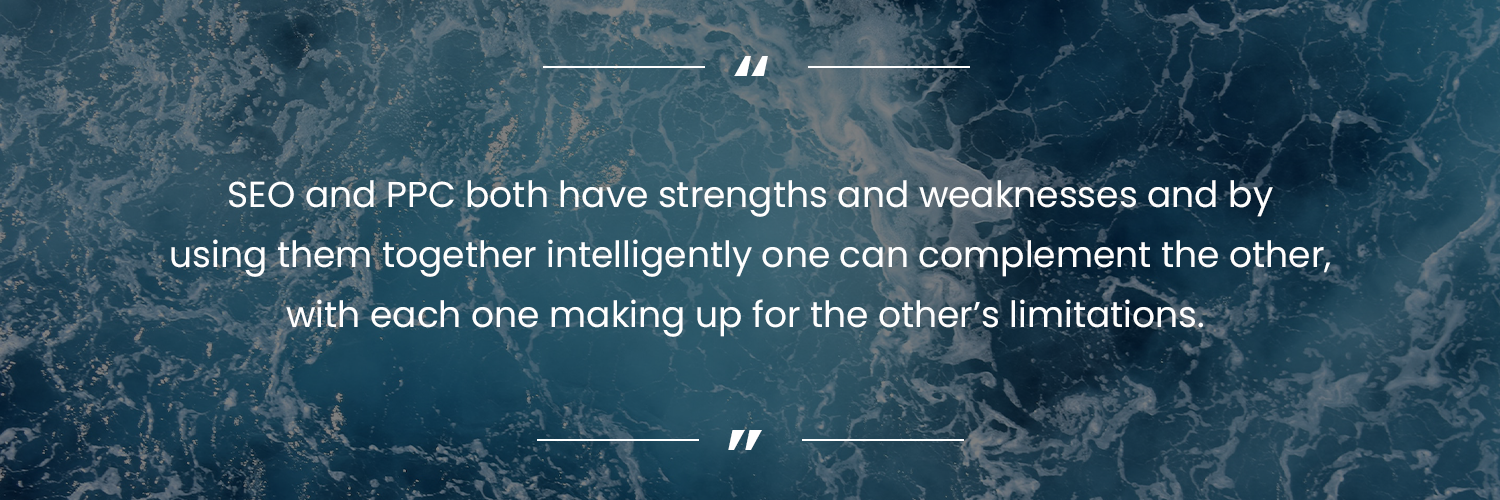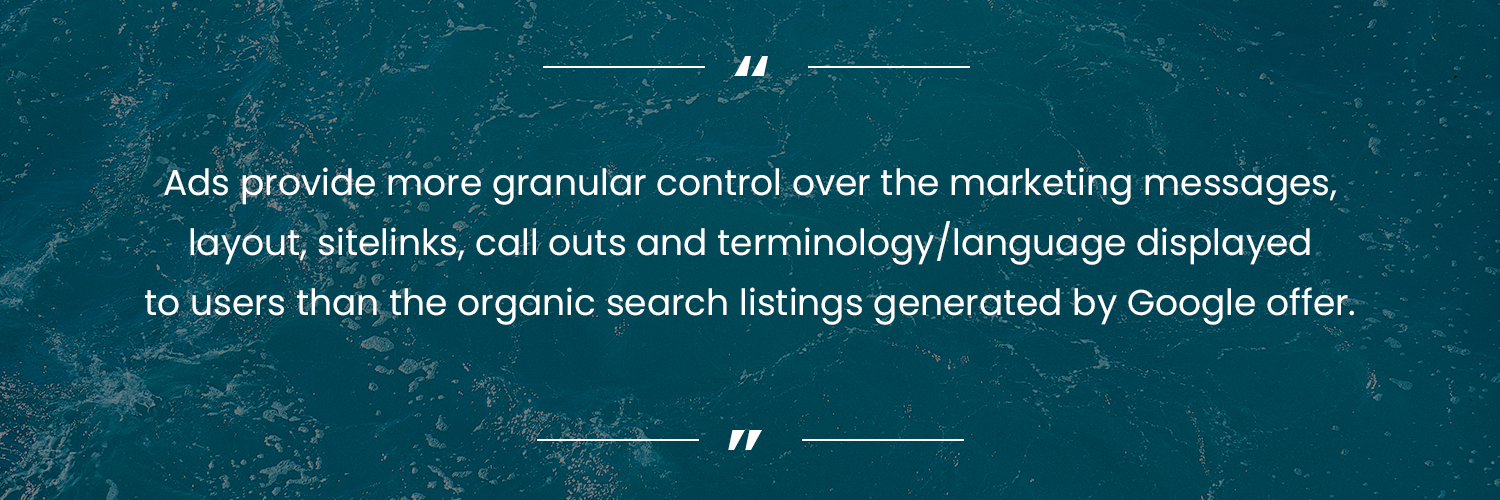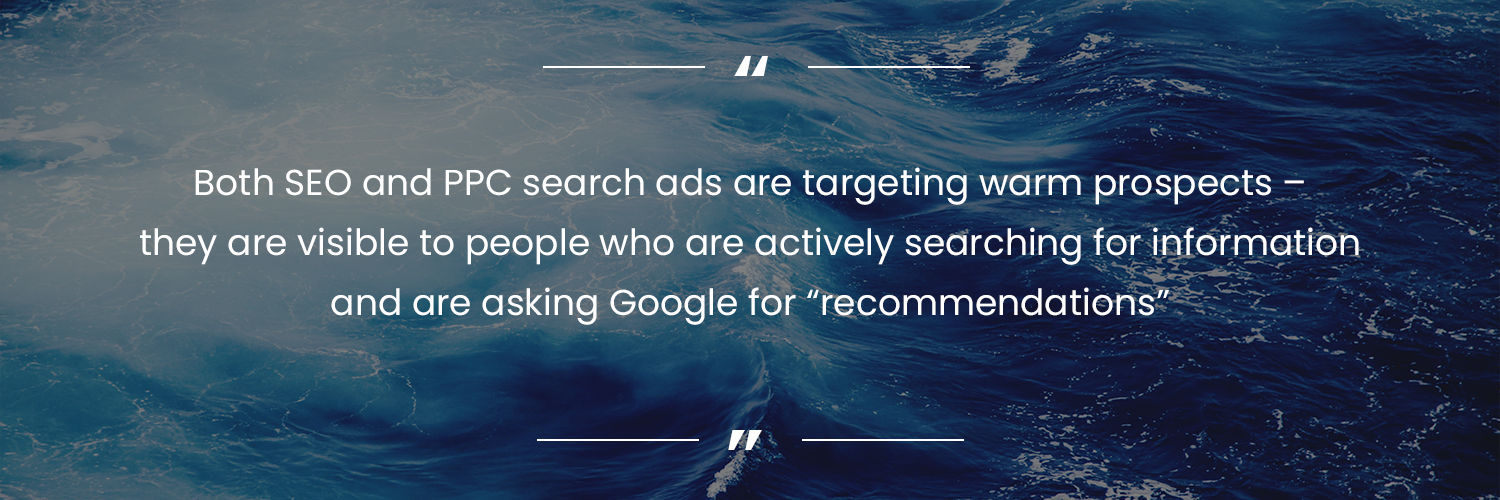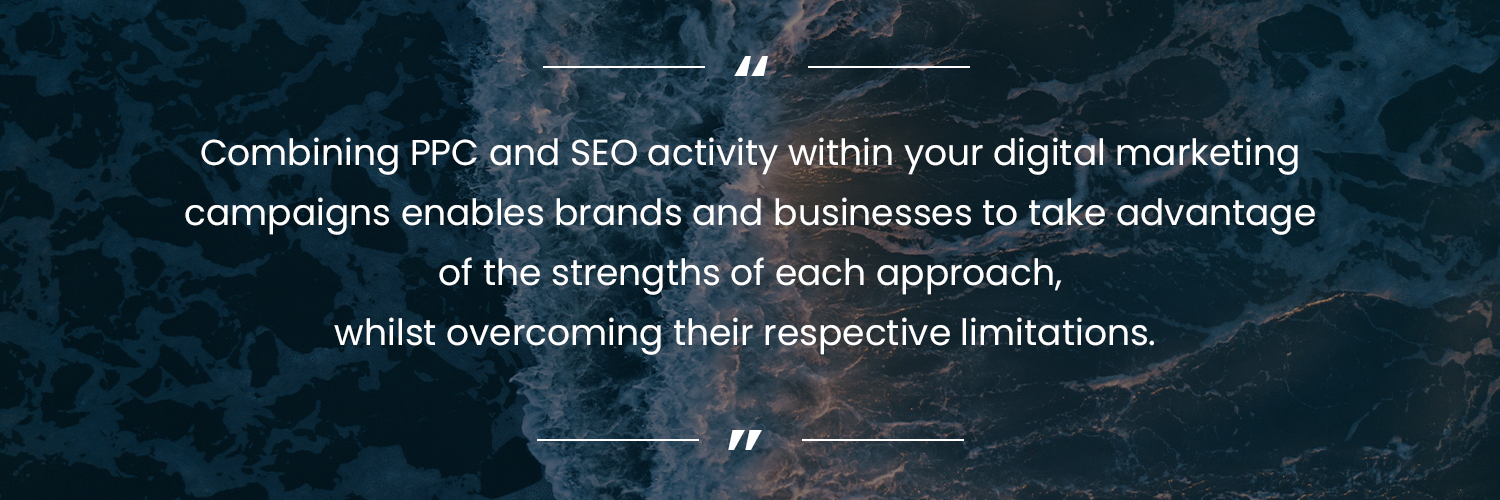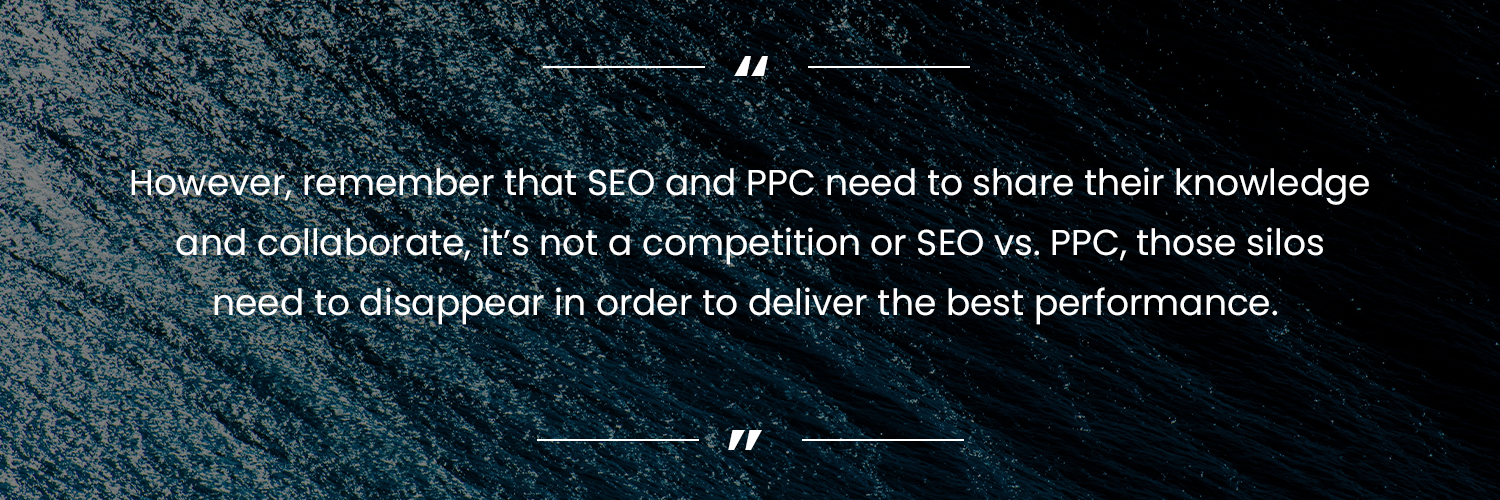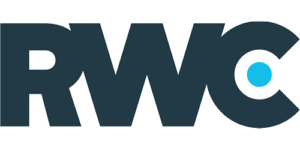Should I Use SEO or PPC? Why not both?
Marketeers are often in a position where they find themselves having to choose between PPC or SEO, often based on budget limitations, perceived constraints based on their campaign goals/objectives, and sometimes instructions from above.
We believe that this is a false dichotomy. SEO and PPC both have strengths and weaknesses and by using them together intelligently one can complement the other, with each one making up for the other’s limitations.
But before we look at how you can use both PPC and SEO campaigns to supercharge your digital marketing efforts, and feed both the top and the bottom of your sales funnel, let’s have a look at the differences between the two, as well as highlighting some similarities.
What are the differences between SEO and PPC Search Ads?
SEO:
- Aim is to get websites ranking at the top of Google for relevant search terms
- Traffic is “Free”
- The good effects of SEO last, even if you leave your SEO agency*
- Takes a lot of time, skill, and effort
- Need to make sure the website is technically “optimised” which means working with a developer
- Content and copy need to be considered, intelligently structured, well written, a good length, and optimised
- Can take any site at least a few months to rank well for chosen keywords, and, in some cases, years if challenging for highly competitive search terms
- Brand new websites can take up to 18 months or longer for mid-level rankings
- Can be tricky to measure ROI in the hands of inexperienced marketeers
- Sites ranking in organic results can improve their perceived credibility with an audience looking for specific services or products. Some search users skip ads and are more trusting of organic results
*Although business owners, marketers, webmasters, and developers can quickly and easily “break” the SEO on a site when they introduce changes to websites if they are inexperienced in SEO, or unaware of vital SEO elements. This can render any historic SEO achievements and rankings meaningless.
PPC Search Ads:
- “Instant” activation – campaigns can be built in days and set live
- Offers a means to quickly test search volumes, search terms and user engagement without waiting for organic rankings to climb
- Ability to appear at the very top of the Search Engine Results Pages (SERPs) if you’re willing to bid enough/allocate enough budget to clicks, irrespective of the website’s authority in the eyes of Google**
- Ads provide advertisers more granular control over the marketing messages, layout, sitelinks, call outs and terminology/language displayed to users than the organic search listings generated by Google offer
- PPC search ads also provide very valuable data via the Google Ads search query reports. This data provides the exact search terms that visitors used to trigger the ads on Google. This enables SEOs to understand, in much greater detail, and with more certainty, what types of search terms people are actually using, along with the actual search volumes for these terms. This allows them to ensure they are optimising content for the right terms and phrases. This is much more accurate data than is available within the usual keyword data sources, such as Keyword Planner, Google Analytics, Search Console, or the range of 3rd party SEO tools
- The best performing ads appear above the fold and above organic (non-paid) results on Google, although ads do also appear at the bottom of the SERPs or underneath organic listings if the bid and/or Quality Score is low
- No need to optimise the whole website, although you need to ensure you have quality landing pages that will convert paid users
- You are paying for traffic
- The more competitive the search terms are that you target, the more expensive your clicks will be
- Ads are highly targeted, and can focus on very specific search terms, but also time/days of the week, geography/location, language, device, and audiences
- The traffic stops when you stop paying
- No lasting positive impact
- Reasonably simple to measure ROI and Return on Ad Spend (ROAS)
**Achieving the top ad positions on the SERPs does not solely rely on your bids as Quality Score is also a factor. Advertisers with better quality scores will usually need to pay less in the auction for top positions than an advertiser with a poor-quality score. The main factors influencing Quality Score are: Ad Relevancy, Landing Page Experience and Expected Click Through Rate (CTR)
What are the similarities between SEO & PPC Search Ads?
- Both SEO and PPC search ads are targeting warm prospects – they are visible to people who are actively searching for information, products, or services, and are asking Google for “recommendations”
- Data from both SEO and PPC can inform and guide approaches in other marketing channels, and on your site itself. From the effectiveness of particular marketing or sales messages, to providing demographic and geographic data for users who convert or engage, and they can inform marketers of the most effective conversion paths and calls to action (CTAs) based on inferred user intent (search queries) which can guide your Conversion Rate Optimisation (CRO) campaigns
- Brand awareness – with both approaches (assuming both are performing optimally), users searching for products or services online will regularly see your brand or product names, which can increase trust, click through rates (CTRs), and conversion rates
A combined SEO and PPC campaign strategy
Combining PPC and SEO activity within your digital marketing campaigns enables brands and businesses to take advantage of the strengths of each approach, whilst overcoming their respective limitations.
This combined approach can support greater results than using either tactic in isolation and combining different Ad platforms and delivery tactics with SEO can enable businesses to reach relevant target users at all stages of the sales funnel.
- Use PPC to test potential SEO target keywords quickly for conversion rates before fully optimising sites/pages for keywords, and then finding out they don’t convert
- Use PPC to provide an instantaneous presence on search engines until SEO can do the heavy lifting (at lower cost), and then move PPC onto the next area of focus while SEO is built up in that new area
- Use PPC to run remarketing ads to those users that visited your website via SEO/organic rankings but did not convert
- Utilise Display advertising to increase brand and/or product awareness at the top of the sales funnel. Display banners can be displayed on a huge range of independent 3rd party websites and apps. These offer relatively low-cost clicks, if users click on them, but these ads are often focussed on brand/product/solution awareness and can trigger organic searches for relevant brand terms at a later date
- Target users based on interests using YouTube ads – topic relevant video ads can display while users are consuming content on YouTube, again, feeding brand or product awareness which can lead to organic, or direct, engagement further down the line
- Use keyword and conversion data from PPC campaigns to feed into, or guide, your SEO keyword strategy
- Test regional and local markets using location-based PPC campaign targeting to see if decent search volumes exist. If so, target these areas using localised/location-based SEO pages
- Move expensive, or low converting keywords, from PPC to organic search
- Running PPC ads for search terms that you rank first for organically will enable you to “own” the primary real estate at the top of the Google results for that term (although not all digital marketers like to run ads against search terms they rank first organically for)
- Use PPC ads to advertise blog, article or Whitepaper content via sitelinks within your ads. This can help get your high value content in front of the right people sooner which can be useful for informational searches that may lead to transactional searches further down the line
- For sites that convert well, running both PPC (including Google Shopping Ads) and SEO will increase the overall volume of relevant search traffic to your site, thereby increasing conversions and sales
- Ad copy that performs well can be fed into your content and SEO plans
- Paid Social Media ads can be used to target users demographically (generally speaking, more effectively than via most Google Ad solutions). Depending on which Social Media ad platform you utilise, advertisers can drill down to highly specific targeting information via Social Media ads, including age, sex, relationship status, interests, job function, job title, employer, business sector/vertical, education, seniority – the list is nearly endless. This highly focussed targeting can then augment and compliment other ad tactics, and organic SEO rankings, to ensure that your target audience is very likely to become quickly aware of what services or products you offer, and understand why they should investigate your business or products further
Summary: Using combined PPC and SEO campaigns in order to increase lead generation
SEO and PPC are both intrinsic elements of any comprehensive multichannel digital marketing plan, for both B2B and B2C campaigns.
Used in combination intelligently, they deliver a more holistic approach to digital marketing campaigns, increase your competitive advantage across highly performing channels, and reach prospects and potential customers just when they are looking for your products or services.
Both work in meeting your business goals, KPIs and revenue targets, and they are proven to positively impact your bottom line and help you overcome the competition if executed by experienced, high quality digital marketing specialists.
And these results are further accelerated when using a combined SEO & PPC strategy.
Using both SEO and PPC will provide you with a better understanding of your potential customer’s requirements, needs, issues, and mindsets, which allows you to fine tune your digital, content, sales, and conversion strategies in order to push those conversion rates up further across all channels.
However, remember that SEO and PPC need to share their knowledge and collaborate, it’s not a competition or SEO vs. PPC, those silos need to disappear in order to deliver the best performance.
Yes, they do work brilliantly individually, but by entwining them, and sharing the knowledge and data, the results can far exceed the targets and KPIs set out for each individual digital specialism.
SEO and PPC teams need to ensure that they are routinely sharing information and data, discussing client changes, learnings, issues, and plans – this will significantly increase your digital visibility, provide you with better insights into what’s working (and what’s not), and can deliver you significantly improved performance across both channels.
Talk to us if you are looking to step up your lead gen performance or need an experienced hand to develop and launch a combined multichannel digital marketing campaign that will elevate your performance and revenue above that of your competitors, it’s what we do.


